Literature
Part I
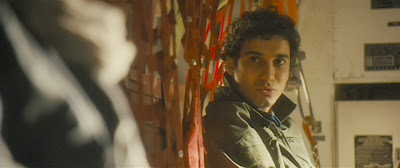
About thirty minutes into World War Z, we find Brad Pitt's Gerry Lane on a military cargo aircraft with Elyes Gabel's Dr. Fassbach, a "virologist from Harvard" who has been tasked with figuring out the cause of (as well as a cure for) the wildly contagious zombie disease spreading over the planet. They are flying to South Korea, on a rumor that the zombie outbreak began there. En route, Fassbach pontificates about the subtlety and craftiness of Nature, musing on how "she loves to play tricks," and "she's a bitch." He even compares Nature to a serial killer. Toward the end of this airborne, spontaneous lecture, Dr. Fassbach gets a maniacal expression on his face, and Brad Pitt looks pensive if also a little disturbed.
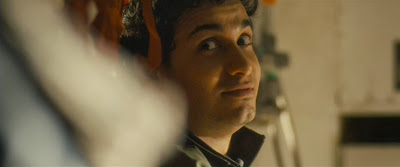
This whole time, after all, they are sitting in a U.S. Marine cargo aircraft on a last ditch effort to save the species, and here this young doctor of medicine is philosophizing about Nature?and more, seeming to get a kick out it (talk about a tenured radical). Dr. Fassbach's part in this film is rather hugely built up, only to be cut short in the next scene: he slips on the rain-slicked aircraft ramp and accidentally shoots himself in the head. But his words live on, coming back into the mind of Pitt in a voiceover later, when Gerry Lane is on the verge of solving the problem of the zombie apocalypse.
Is it really a problem, though, if indeed the zombie outbreak is an extension of Nature? The thing about zombies is that they have supposedly broken from the natural order: they are the un-dead, they (non)exist beyond an allegedly 'natural' human timeline of life and death. The zombies in this film click their teeth and sniff the air as if they are hungry, but they really just want to bite people?and only then to turn them into similar creatures. It's not about eating; it's about community, and a kind of asexual and finite reproduction.
Furthermore, they seem to have achieved a state of weird biological equilibrium, the sin qua non of certain ideas of ecology: this humanoid sub-species doesn't need to extract resources, exterminate other species, or build things?they just like to hang out. For when there are no more healthy non-zombie people to bite, the zombies go dormant, simply standing around and jerking occasionally (as we see later in the film). They don't have to work or struggle, they can just chill. Given contemporary culture's everyday wish images of vacation, retirement, off-time, and vegging out?does zombie life really sound so bad?
Nature is a strange problem that lurks throughout this movie. Nature plays a double role, both the background and the foreground, the riddle to solve and the inescapable condition. It is what causes the zombies in the first place (as a virus of some sort); yet it also, according to Dr. Fassbach, holds the keys and clues to the mystery. Nature in World War Z is something to 'catch' in a double sense: as a virus, and as an culprit who causes the virus. The reason they've sent a virologist on the mission is to figure out the disease and come up with a solution, a cure. Nature is figured as dynamic, adaptive, generative of new viruses and forms of life; some of this is threatening to human life, and thus humans push back, to keep the species from changing too much (or too quickly) or becoming extinct (at least not in our lifetime). At the same time, Nature is something to be held in check, perceived and controlled as an external entity.
Yet if Nature is something that at times needs to be recuperated or set in balance (à la those "Take Back America" bumper stickers), then it is precisely the humans who are ill-directed here: they should join the zombies, for the zombies have achieved a stable state within a dynamic system, a state that would seem to be able to exist in perfect harmony with the rest of Nature even within a broader state of flux. Humanoids as an entirely stable population of sloths: it's progress at its apex, satisfaction pretty much guaranteed.*
Except that this is the foil of 'Nature' as a concept. As Nietzsche describes it in Beyond Good & Evil, the desire to live according to Nature is incoherent, or at best tautological, as it sets up an opposition that always immediately collapses.** It's like saying you want to live according to life. Well, how could it be otherwise? Such too this mad mission of a species (humans, i.e., Nature) to rid Nature of something it generated, the zombies (again, Nature).
Part II
The setting of Dr. Fassbach's Nature lesson is hardly coincidental. World War Z is in part, in fact, a startling and savage critique of modern air travel.
Earlier in the film, Gerry Lane's former boss Thierry Umutoni, U.N. Deputy Secretary-General (played by Fana Mokoena), briefs Lane on the situation and mentions offhand, concerning the virus, that "the airlines were the perfect delivery system..."
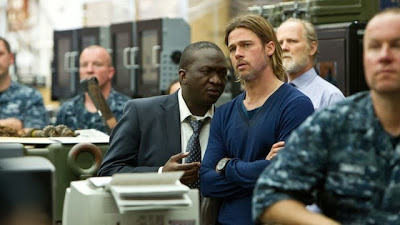
Later in the film, Gerry Lane barely escapes an overrun Jerusalem, enplaning onto a Belarus Airways wide-body jetliner at the last second before it takes off.
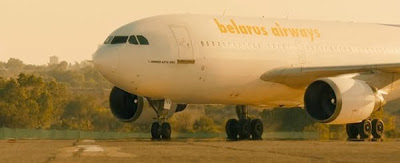
Lane makes it out in the nick of time: from the airplane window on ascent, we see the teeming masses of zombies and the devastation below.
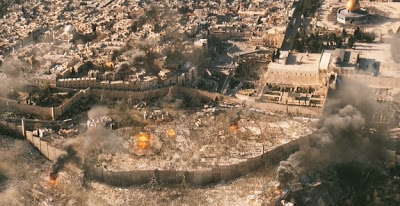
Never mind: everything seems fine on the flight?a little relief, at last. That is, until the plane is making its descent into Cardiff, Wales, and Lane hears/feels some thumping toward the back of the plane. He cautiously strolls down the aisle to check it out.
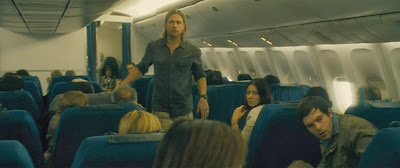
What I want to seize on here is the total banality of this scene: it is the pinnacle of modern progress, summed up in the interior space of the commercial airliner. But when Lane peeks through the divide that separates Business from Economy Class, he sees an awful sight: there was a zombie stowaway on the plane that finally broke loose from the nether regions of the aircraft, and is wreaking havoc and thus multiplying.
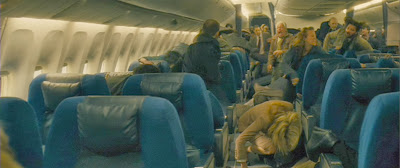
On the one hand, this is a terrifying scenario. On the other hand, though, does it really look all that different from a normal scene of boarding, wherein we jockey for seats, armrests, and carry-on stowage? Incidentally, this whole episode was all the fault of a particular flight attendant: to wit, the crouching beige-clad woman in the mid-foreground, who unknowingly freed the secret sharer from a storage elevator in the rear galley. When she raises her head in preparation to attack Lane, we are presented with one of the exciting face-to-face moments in the film:
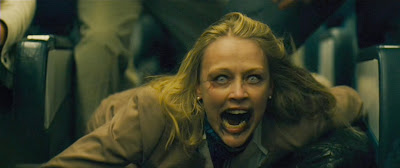
Now having worked at an airport for a few years earlier in my life, I am fairly sympathetic to the grueling labor of air travel, and I do not wish to make fun of airline workers. But this sequence seems to me to be a clear jab: is this look so distinct from how we encounter (or at least hyperbolically imagine) irate, snippy flight attendants in so many mundane disciplinary contexts onboard commercial airliners? Sir, turn that phone off immediately!
At this point Lane's only recourse is to hurl a hand-grenade (how he got it is another story, not important for our purposes here) back toward Economy section of the cabin, and duck. This rather takes care of the immediate zombie problem, but it doesn't bode well for the plane.
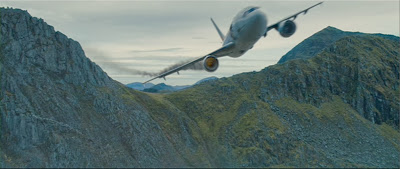
And here we are back at Nature, which arrives in pristine form around a stunningly spectacular plane crash:
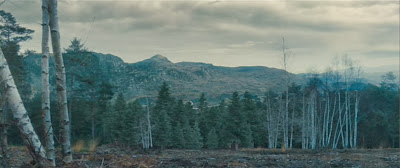
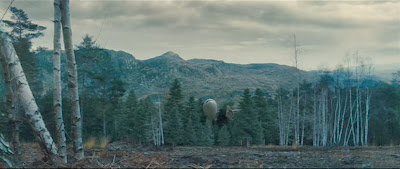
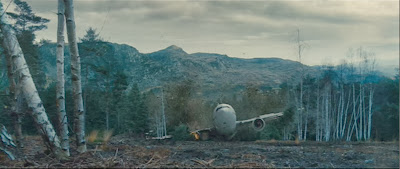
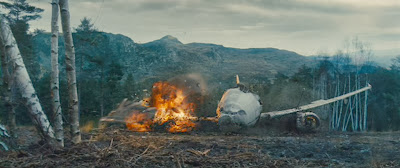
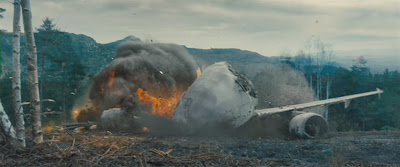
This is something I have written about elsewhere, but it is as if to say, You want Nature? You got it! It's all around: in the mountains, the white barked aspens, the firs and pines, the heavy clouds?it's a ridiculously scenic vista, re-marked as it were as a 'scene' where Nature really resides. Human flight always comes crashing back to the ground. The wild landscape frames this disaster, and clears away something of a blank slate for the human subject qua survivor, in the singular form of Brad Pitt.***
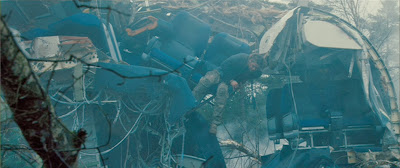
The tree trunk in the foreground of this shot reminds us that here, amid the redundant wire tangles and calamitous wreckage, we're in the realm of Nature. This is where we can start fresh, back at ground zero. It is no wonder that the crash scene is precipitated by a sequence that wonderfully and uncannily calls to mind Edward Norton's own mid-air collision fantasy in Fight Club:
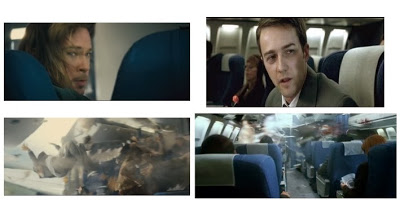
--
* It really doesn't look all that unfamiliar to other forms of life we know. For instance, Baz Luhrman's sick and gas-pumping "Wilson" (on the left, below) in The Great Gatsby adopts a similar posture and aura. And as in Elizabeth Bishop's poem "Filling Station," we discover an eccentric ecosystem thriving at this greasy juncture.
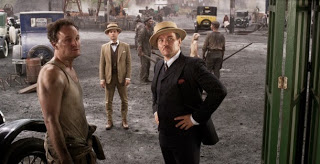
- Environmentality & The Visual Culture Of Plane Crashes
"Project Mayhem" briefing card from the film Fight Club (20th-c Fox, David Fincher, 1999) This post is a sneak peek of part of an essay of mine that is being published in a book called Beauty, Violence, Representation (as part of the Routledge...
- Brad Pitt At The Airport
So Brad Pitt didn't win an Oscar. It's really not that surprising, after all. As my friend Robert Bennett has speculated, Pitt is considered at turns too popular or too artsy to be viable Oscar material. Which is really a shame, because he should...
- It's In The Air
A short essay about my airport work?cleaning out aircraft seat-back pockets at night?is in the current issue of Narrative magazine. Meanwhile, over at Room 220 Nate Martin recently discussed the fantastic atmospheric photographs of JFK by Sophie Lvoff,...
- Rey Chow On New Media
Recently I attended a talk by Rey Chow, who gave a provocative talk called "Postcolonial Visibilities: Foucault, Deleuze, and the New Media Technologies." Among other things, Chow discussed the seemingly paradoxical phenomenon by which images of the lowest...
- On Crashing: An Inquiry Of Fragments
We chose this plane because we didn?t know that It would become the subject Of a poem. To us poetry is ludicrous, As if telling a hawk he has talons. ?Mark Yakich, ?Last Flight out of a State of Mind? A recent article from the Times reports that the...
Literature
On Nature & Planes in World War Z
Part I
Nature

About thirty minutes into World War Z, we find Brad Pitt's Gerry Lane on a military cargo aircraft with Elyes Gabel's Dr. Fassbach, a "virologist from Harvard" who has been tasked with figuring out the cause of (as well as a cure for) the wildly contagious zombie disease spreading over the planet. They are flying to South Korea, on a rumor that the zombie outbreak began there. En route, Fassbach pontificates about the subtlety and craftiness of Nature, musing on how "she loves to play tricks," and "she's a bitch." He even compares Nature to a serial killer. Toward the end of this airborne, spontaneous lecture, Dr. Fassbach gets a maniacal expression on his face, and Brad Pitt looks pensive if also a little disturbed.

This whole time, after all, they are sitting in a U.S. Marine cargo aircraft on a last ditch effort to save the species, and here this young doctor of medicine is philosophizing about Nature?and more, seeming to get a kick out it (talk about a tenured radical). Dr. Fassbach's part in this film is rather hugely built up, only to be cut short in the next scene: he slips on the rain-slicked aircraft ramp and accidentally shoots himself in the head. But his words live on, coming back into the mind of Pitt in a voiceover later, when Gerry Lane is on the verge of solving the problem of the zombie apocalypse.
Is it really a problem, though, if indeed the zombie outbreak is an extension of Nature? The thing about zombies is that they have supposedly broken from the natural order: they are the un-dead, they (non)exist beyond an allegedly 'natural' human timeline of life and death. The zombies in this film click their teeth and sniff the air as if they are hungry, but they really just want to bite people?and only then to turn them into similar creatures. It's not about eating; it's about community, and a kind of asexual and finite reproduction.
Furthermore, they seem to have achieved a state of weird biological equilibrium, the sin qua non of certain ideas of ecology: this humanoid sub-species doesn't need to extract resources, exterminate other species, or build things?they just like to hang out. For when there are no more healthy non-zombie people to bite, the zombies go dormant, simply standing around and jerking occasionally (as we see later in the film). They don't have to work or struggle, they can just chill. Given contemporary culture's everyday wish images of vacation, retirement, off-time, and vegging out?does zombie life really sound so bad?
Nature is a strange problem that lurks throughout this movie. Nature plays a double role, both the background and the foreground, the riddle to solve and the inescapable condition. It is what causes the zombies in the first place (as a virus of some sort); yet it also, according to Dr. Fassbach, holds the keys and clues to the mystery. Nature in World War Z is something to 'catch' in a double sense: as a virus, and as an culprit who causes the virus. The reason they've sent a virologist on the mission is to figure out the disease and come up with a solution, a cure. Nature is figured as dynamic, adaptive, generative of new viruses and forms of life; some of this is threatening to human life, and thus humans push back, to keep the species from changing too much (or too quickly) or becoming extinct (at least not in our lifetime). At the same time, Nature is something to be held in check, perceived and controlled as an external entity.
Yet if Nature is something that at times needs to be recuperated or set in balance (à la those "Take Back America" bumper stickers), then it is precisely the humans who are ill-directed here: they should join the zombies, for the zombies have achieved a stable state within a dynamic system, a state that would seem to be able to exist in perfect harmony with the rest of Nature even within a broader state of flux. Humanoids as an entirely stable population of sloths: it's progress at its apex, satisfaction pretty much guaranteed.*
Except that this is the foil of 'Nature' as a concept. As Nietzsche describes it in Beyond Good & Evil, the desire to live according to Nature is incoherent, or at best tautological, as it sets up an opposition that always immediately collapses.** It's like saying you want to live according to life. Well, how could it be otherwise? Such too this mad mission of a species (humans, i.e., Nature) to rid Nature of something it generated, the zombies (again, Nature).
Part II
Planes
The setting of Dr. Fassbach's Nature lesson is hardly coincidental. World War Z is in part, in fact, a startling and savage critique of modern air travel.Earlier in the film, Gerry Lane's former boss Thierry Umutoni, U.N. Deputy Secretary-General (played by Fana Mokoena), briefs Lane on the situation and mentions offhand, concerning the virus, that "the airlines were the perfect delivery system..."

Later in the film, Gerry Lane barely escapes an overrun Jerusalem, enplaning onto a Belarus Airways wide-body jetliner at the last second before it takes off.

Lane makes it out in the nick of time: from the airplane window on ascent, we see the teeming masses of zombies and the devastation below.

Never mind: everything seems fine on the flight?a little relief, at last. That is, until the plane is making its descent into Cardiff, Wales, and Lane hears/feels some thumping toward the back of the plane. He cautiously strolls down the aisle to check it out.

What I want to seize on here is the total banality of this scene: it is the pinnacle of modern progress, summed up in the interior space of the commercial airliner. But when Lane peeks through the divide that separates Business from Economy Class, he sees an awful sight: there was a zombie stowaway on the plane that finally broke loose from the nether regions of the aircraft, and is wreaking havoc and thus multiplying.


Now having worked at an airport for a few years earlier in my life, I am fairly sympathetic to the grueling labor of air travel, and I do not wish to make fun of airline workers. But this sequence seems to me to be a clear jab: is this look so distinct from how we encounter (or at least hyperbolically imagine) irate, snippy flight attendants in so many mundane disciplinary contexts onboard commercial airliners? Sir, turn that phone off immediately!
At this point Lane's only recourse is to hurl a hand-grenade (how he got it is another story, not important for our purposes here) back toward Economy section of the cabin, and duck. This rather takes care of the immediate zombie problem, but it doesn't bode well for the plane.

And here we are back at Nature, which arrives in pristine form around a stunningly spectacular plane crash:


This is something I have written about elsewhere, but it is as if to say, You want Nature? You got it! It's all around: in the mountains, the white barked aspens, the firs and pines, the heavy clouds?it's a ridiculously scenic vista, re-marked as it were as a 'scene' where Nature really resides. Human flight always comes crashing back to the ground. The wild landscape frames this disaster, and clears away something of a blank slate for the human subject qua survivor, in the singular form of Brad Pitt.***

The tree trunk in the foreground of this shot reminds us that here, amid the redundant wire tangles and calamitous wreckage, we're in the realm of Nature. This is where we can start fresh, back at ground zero. It is no wonder that the crash scene is precipitated by a sequence that wonderfully and uncannily calls to mind Edward Norton's own mid-air collision fantasy in Fight Club:

parallel plane crash fantasies in World War Z and Fight Club
These are fantasies of getting back to Nature, to real experience?in Thoreau's words, "Contact! Contact!" Yet if we really wanted this immediacy in the context of World War Z, we would need only allow ourselves to be bitten. The zombies aren't struggling against?or to get closer to?Nature. They are it. As are we.
And here is the harsh critique of air travel: just when we thought we were farthest from Nature, nestled in our elaborate techno-cultural tubes of flight, we were in fact closer than ever to it. We can fly, but we cannot hide. Work that into your Nature lecture, Dr. Fassbach.
--
* It really doesn't look all that unfamiliar to other forms of life we know. For instance, Baz Luhrman's sick and gas-pumping "Wilson" (on the left, below) in The Great Gatsby adopts a similar posture and aura. And as in Elizabeth Bishop's poem "Filling Station," we discover an eccentric ecosystem thriving at this greasy juncture.

** You desire to LIVE "according to Nature"? Oh, you noble Stoics, what fraud of words! Imagine to yourselves a being like Nature, boundlessly extravagant, boundlessly indifferent, without purpose or consideration, without pity or justice, at once fruitful and barren and uncertain: imagine to yourselves INDIFFERENCE as a power?how COULD you live in accordance with such indifference? To live?is not that just endeavouring to be otherwise than this Nature? Is not living valuing, preferring, being unjust, being limited, endeavouring to be different? And granted that your imperative, "living according to Nature," means actually the same as "living according to life"?how could you do DIFFERENTLY? Why should you make a principle out of what you yourselves are, and must be? In reality, however, it is quite otherwise with you: while you pretend to read with rapture the canon of your law in Nature, you want something quite the contrary, you extraordinary stage-players and self-deluders! In your pride you wish to dictate your morals and ideals to Nature, to Nature herself, and to incorporate them therein; you insist that it shall be Nature "according to the Stoa," and would like everything to be made after your own image, as a vast, eternal glorification and generalism of Stoicism! With all your love for truth, you have forced yourselves so long, so persistently, and with such hypnotic rigidity to see Nature FALSELY, that is to say, Stoically, that you are no longer able to see it otherwise?and to crown all, some unfathomable superciliousness gives you the Bedlamite hope that BECAUSE you are able to tyrannize over yourselves?Stoicism is self-tyranny?Nature will also allow herself to be tyrannized over: is not the Stoic a PART of Nature?... But this is an old and everlasting story: what happened in old times with the Stoics still happens today, as soon as ever a philosophy begins to believe in itself. It always creates the world in its own image; it cannot do otherwise; philosophy is this tyrannical impulse itself, the most spiritual Will to Power, the will to "creation of the world," the will to the causa prima. (trans. Helen Zimmern)
*** The nexus of Brad Pitt and crashing is a topic I take up at greater length in Deconstructing Brad Pitt.
- Environmentality & The Visual Culture Of Plane Crashes
"Project Mayhem" briefing card from the film Fight Club (20th-c Fox, David Fincher, 1999) This post is a sneak peek of part of an essay of mine that is being published in a book called Beauty, Violence, Representation (as part of the Routledge...
- Brad Pitt At The Airport
So Brad Pitt didn't win an Oscar. It's really not that surprising, after all. As my friend Robert Bennett has speculated, Pitt is considered at turns too popular or too artsy to be viable Oscar material. Which is really a shame, because he should...
- It's In The Air
A short essay about my airport work?cleaning out aircraft seat-back pockets at night?is in the current issue of Narrative magazine. Meanwhile, over at Room 220 Nate Martin recently discussed the fantastic atmospheric photographs of JFK by Sophie Lvoff,...
- Rey Chow On New Media
Recently I attended a talk by Rey Chow, who gave a provocative talk called "Postcolonial Visibilities: Foucault, Deleuze, and the New Media Technologies." Among other things, Chow discussed the seemingly paradoxical phenomenon by which images of the lowest...
- On Crashing: An Inquiry Of Fragments
We chose this plane because we didn?t know that It would become the subject Of a poem. To us poetry is ludicrous, As if telling a hawk he has talons. ?Mark Yakich, ?Last Flight out of a State of Mind? A recent article from the Times reports that the...
